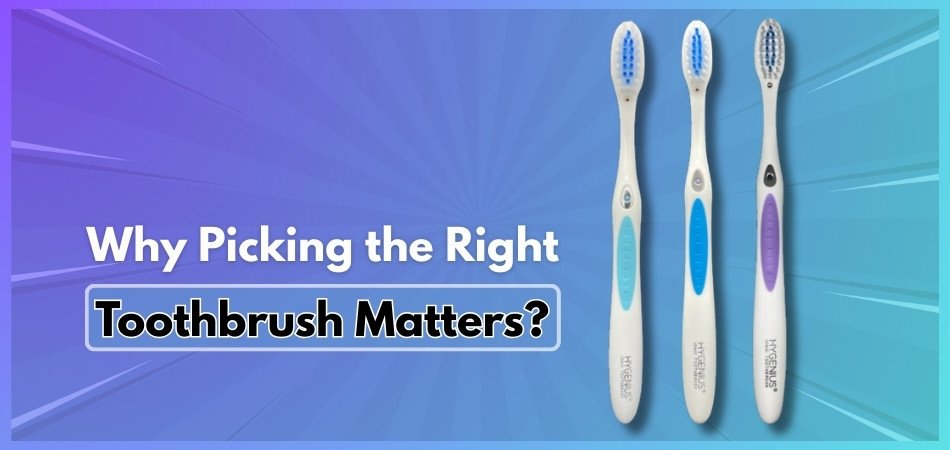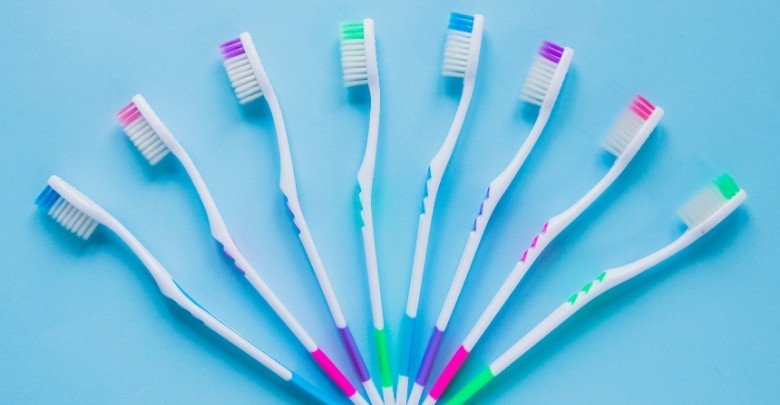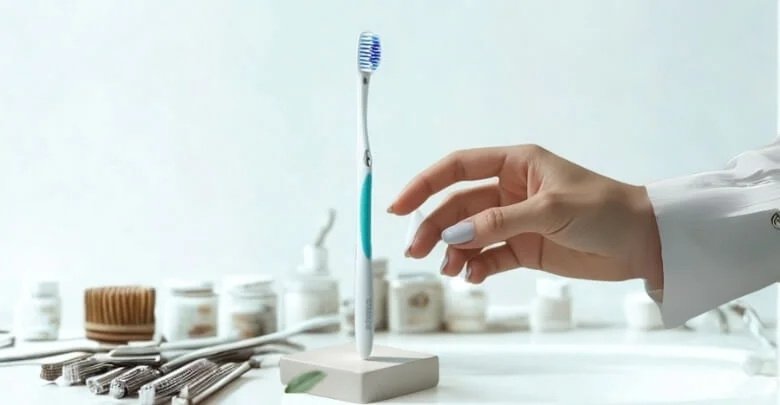Dental care is more than just a routine these days; it’s about using the right tools that actually protect your teeth and gums. The toothbrush you choose plays a bigger role than most people think. Some are too rough, some don’t clean enough, and that often leaves your mouth less healthy than it should be. That’s why many people find themselves wondering about one simple thing: Why picking the right toothbrush matters?
Picking the right toothbrush is important because it removes plaque effectively, protects sensitive gums, keeps breath fresh, and makes brushing easier. A proper toothbrush reduces long-term risks like cavities and gum problems while improving daily comfort and overall oral health.
Are you curious to know how your toothbrush choice can make such a big difference? If so, keep reading the following section of this article because it contains all the information you need to comprehend why picking the right toothbrush is one of the best ways to maintain healthier teeth and gums.
Why Picking the Right Toothbrush Matters?
Brushing teeth seems like a small habit, but the type of toothbrush you use can change how well your mouth actually stays clean. Some brushes are too rough, while others don’t clean enough. Choosing the right one makes all the difference. Keep reading to see why it matters.

Plaque Control
Plaque is a sticky layer that builds up on teeth every day. If it’s not removed properly, it can harden into tartar and cause bigger problems. A good toothbrush helps break down plaque more effectively. This means fewer dental issues over time.
Gum Health
Your gums are sensitive, and the wrong brush can damage them. Hard bristles may scratch or make gums bleed, which isn’t good for long-term health. A well-designed toothbrush has softer bristles that protect gums while still cleaning well. This helps keep your smile healthy without discomfort.
Fresh Breath
Bad breath often comes from leftover food and bacteria stuck on your teeth. A toothbrush that reaches every corner of your mouth helps reduce this problem. By brushing properly with the right tool, you’ll notice fresher breath that lasts longer. It’s not just about toothpaste; the brush really matters.
Comfort While Brushing
If a toothbrush feels heavy or awkward, brushing becomes a chore. A lightweight and slim handle makes it easier to brush without straining your hand. Comfortable brushes encourage better cleaning habits. When brushing feels simple, you’re more likely to stick to it.
Long-term Protection
Brushing with the wrong toothbrush may not show problems right away. But over time, weak cleaning can lead to cavities and gum issues. A proper toothbrush keeps teeth stronger and healthier for years. Think of it as a small daily step that prevents bigger dental bills later.
Ease of Use
Complicated brushes with too many buttons or charging needs can be frustrating. Simple designs that are easy to hold and use make the whole routine smoother. The best toothbrush doesn’t just clean well, it also saves time and effort. This way, brushing feels quick and stress-free.
Better Daily Confidence
Clean teeth and fresh breath give a natural boost of confidence. When you know your smile looks good, you feel more comfortable talking to people. The right toothbrush plays a part in keeping that confidence strong. It’s a simple tool, but it makes a big difference every day.
How to Pick the Right Toothbrush?
Daily brushing starts with the right toothbrush, and the one you choose can make a bigger difference than you realize. Not every brush is the same, and the wrong one may not keep your teeth and gums fully healthy. If you’re wondering how to pick the right option, here are some key things to consider.

Bristle Type
The bristles are one of the most important parts of a toothbrush. Soft bristles are usually best because they clean well without hurting your gums. Hard bristles may feel like they scrub more, but they can cause irritation and even damage over time. Picking the right bristle type helps keep your teeth and gums safe.
Brush Head Size
Choosing the right brush head size matters more than many people think. A smaller head can reach the back teeth and tight corners more easily. Bigger heads may feel like they cover more area, but often miss hard-to-reach spots. A balanced size makes brushing easier and more effective.
Handle Comfort
A toothbrush should feel comfortable in your hand. Slim and lightweight handles are usually easier to control, especially when brushing all sides of your teeth. A bulky or heavy handle can make brushing feel like a chore. The right grip makes the routine smoother.
Manual vs Electric
Some people prefer manual brushes while others go for electric ones. Manual brushes work fine if you brush carefully with good technique. Electric brushes can add extra power and help remove more plaque with less effort. The choice depends on what feels easier and more effective for you.
Replaceable Heads
Over time, bristles wear out and lose their cleaning ability. A good toothbrush should have an easy way to replace the head without trouble. Fresh bristles make a big difference in cleaning properly. Changing heads every few months keeps the brush working at its best.
Special Features
Some toothbrushes come with small extras that can be useful. For example, in the Hygenius Ionic toothbrush review, users have mentioned the built-in timer, soft grip, and an indicator light as helpful features that improve your brushing routine. These extras aren’t always necessary, but they can make brushing simpler and more reliable. Think of them as added convenience.
Personal Needs
Everyone’s teeth and gums are different. If you have sensitive gums, soft bristles and a gentle brush are better. If you travel often, a light brush without chargers may be more practical. Matching the toothbrush to your personal needs makes brushing both effective and comfortable.
Are Ionic Toothbrushes Better Than Traditional Toothbrushes?
Yes, ionic toothbrushes can be better than traditional ones for many reasons. They use ion technology to break down plaque. This method requires no extra pressure, making it gentle on gums. It helps clean teeth more effectively without hard scrubbing.
The main benefit of ionic toothbrushes is that they don’t need much effort to clean. Unlike traditional brushes, they break the bond between plaque and teeth using ions. This means you don’t need to press down hard. There is no potential drawback of ionic toothbrushes, as they are gentle yet efficient.
Traditional toothbrushes rely on manual brushing to remove plaque, which can miss areas. Ionic toothbrushes reach these spots more easily. They also provide consistent cleaning without requiring battery charging or special maintenance. With ionic toothbrushes, brushing feels like a smoother, more comfortable experience.
How Often Should You Replace Your Toothbrush?
You should replace your toothbrush every three to four months. The bristles lose their effectiveness over time, making brushing less effective. If the bristles are frayed, it’s time for a new one. This ensures you’re getting a proper clean and healthy gums.
If you’ve been sick, consider changing your toothbrush sooner. Bacteria from an illness can stay on the bristles. Replacing your toothbrush after being sick helps prevent reinfection. Keeping your toothbrush fresh is an easy way to stay healthy.
Also, if the brush head shows signs of wear, it’s time to replace it. Even with regular brushing, bristles can wear out. A worn-out toothbrush won’t clean your teeth as well. Regularly changing your brush helps maintain your oral health.
Types of Toothbrushes that Make You Confused When Picking the Right One
There are many types of toothbrushes out there, and it can be hard to know which one is best. Some might seem similar, while others have unique features that sound good but aren’t always necessary. Let’s take a closer look at the different types of toothbrushes that may leave you wondering.

Manual Toothbrush
Manual toothbrushes are the traditional option and come in various shapes and sizes. They don’t require batteries or charging, so they’re easy to use anywhere. However, they rely entirely on your brushing technique to remove plaque. If not used properly, they might not clean your teeth as well as electric brushes.
Electric Toothbrush
Electric toothbrushes have a motor that helps with brushing, making it easier to remove plaque. When choosing one, there are several tips for selecting an electric toothbrush to keep in mind, like checking for various modes and comfort. They usually have different settings, such as cleaning or gum care, which makes brushing feel more effective. However, they need to be charged and can be a bit bulky to carry around. Some people find the vibrations uncomfortable at first.
Ionic Toothbrush
Ionic toothbrushes are a newer option that uses ion technology to break the bond between plaque and your teeth. They don’t require hard scrubbing or extra pressure, making them gentler on your gums. These brushes don’t need charging or batteries, and they are often easier to use. However, they might not be as widely available as other types.
Sonic Toothbrush
Sonic toothbrushes use high-frequency vibrations to clean your teeth, making them much faster than regular electric brushes. These brushes can reach deeper into the gaps between teeth and are very effective at plaque removal. But they tend to be pricier than manual or regular electric brushes. They also require regular maintenance and charging.
Power Toothbrush
Power toothbrushes are similar to electric toothbrushes but tend to be more affordable. They have a rotating head that moves on its own, offering a more consistent brushing motion. However, they usually have fewer settings compared to electric or sonic brushes, and their cleaning power can be less efficient.
Battery-operated Toothbrush
Battery-operated toothbrushes are another alternative, running on replaceable batteries. These toothbrushes don’t need to be plugged in, making them portable. While they offer more power than a manual toothbrush, their performance isn’t as strong as an electric one. They are a budget-friendly option but may lack some advanced features.
Travel Toothbrush
Travel toothbrushes are compact and designed for on-the-go use. These are perfect for vacations, work trips, or just carrying in your bag. While they’re easy to pack and lightweight, they might not be as effective at cleaning compared to other types. You may need to press a little harder to get the same results.
Tips to Avoid Mistakes When Choosing a Toothbrush
When selecting a toothbrush, it’s easy to overlook important details that can affect your oral care. Making the right choice ensures better cleaning and comfort. Here are some tips to help you avoid common mistakes.
- Choosing the Wrong Toothbrush Type: Don’t just pick any toothbrush. Electric, manual, and ionic toothbrushes offer different benefits—select one based on your needs.
- Ignoring Toothbrush Durability: A toothbrush with flimsy construction will wear out quickly. Choose a well-built toothbrush for long-lasting performance and better value.
- Not Checking Bristle Arrangement: Irregular bristle patterns may miss plaque buildup. Opt for a toothbrush with well-organized bristles for more thorough cleaning.
- Opting for an Unfit Handle Design: A toothbrush with a slippery or thick handle can make brushing uncomfortable. Look for ergonomic designs that fit well in your hand.
- Selecting a Brush Without a Cap: A toothbrush without a cap can pick up bacteria. Choose one with a cap or case to keep it hygienic when stored.
- Not Paying Attention to Brush Angle: The angle of the toothbrush head matters for efficient brushing. Make sure it’s designed to reach your teeth’s surface at a proper angle.
- Overlooking Brush Flexibility: A stiff brush might not adapt to your teeth’s curves. Choose a brush with a flexible head for a more comfortable clean.
- Choosing Based Only on Price: Don’t assume an expensive toothbrush is the best. Focus on the features that matter, not just the price tag.
Frequently Asked Questions
When it comes to picking the right toothbrush, many questions might pop into your mind. To help you make an informed choice, here are some frequently asked questions (FAQs) that cover important aspects not yet discussed in the article.
Can a Toothbrush Design Help With Gum Health?
Yes, a toothbrush with a well-designed head and soft bristles can significantly benefit your gum health. It helps to avoid gum irritation while cleaning plaque effectively. Brushing gently with the right design protects the delicate gum tissue and prevents bleeding.
Should I Consider Eco-friendly Toothbrushes?
Eco-friendly toothbrushes are a great option if you want to reduce plastic waste. These brushes are often made from bamboo or other biodegradable materials. By switching to an eco-friendly toothbrush, you are making a positive impact on the environment without compromising your oral hygiene.
What Role Does Brushing Pressure Play When Using a Toothbrush?
Brushing with too much pressure can damage your gums and enamel. It’s important to apply gentle pressure while brushing to avoid causing harm. A good toothbrush will be effective at cleaning without requiring you to press too hard, protecting your oral health.
How Can I Tell if My Toothbrush is Working Effectively?
You can tell your toothbrush is working well if your teeth feel smooth after brushing. If plaque or tartar buildup still remains, you may need a different type of toothbrush. Consistent use of the right brush will lead to cleaner teeth and healthier gums.
Do Electric Toothbrushes Clean Better Than Manual Ones?
Electric toothbrushes are more effective at removing plaque due to their constant motion. They provide more consistent brushing and often come with built-in timers to ensure you brush for the recommended time. Many people find that electric brushes make brushing easier and more thorough.
Can a Toothbrush Affect the Whiteness of My Teeth?
Yes, using the right toothbrush can affect the appearance of your teeth. Some toothbrushes, especially those with soft bristles and proper design, can help remove surface stains over time. Regular brushing with the correct brush helps keep your teeth looking bright and clean.
How Do Toothbrush Bristles Impact Teeth Sensitivity?
Teeth sensitivity can be made worse with hard or stiff bristles. If you have sensitive teeth, using a toothbrush with soft bristles will help reduce discomfort. Soft bristles are effective for cleaning while being gentle on your teeth and gums.
Bottom Line
Choosing the right toothbrush is one of the simplest yet most important steps in maintaining healthy teeth and gums. The type of toothbrush you use can impact how effectively you remove plaque, prevent gum damage, and keep your breath fresh. Small changes, like switching to a gentler brush or finding one that suits your needs, can make a big difference.
When thinking about why picking the right toothbrush matters, it’s about comfort and results. You’ll notice healthier teeth and gums by simply choosing a brush that works best for you. Plus, proper brushing habits prevent more serious dental issues down the line.
Eventually, investing in the right toothbrush isn’t just about cleaning; it’s about long-term oral health. Take your time in selecting a brush that fits your routine, and you’ll enjoy a cleaner, brighter smile every day.






